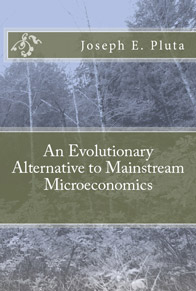Description:
This book is about some of the approaches and applications of evolutionary economics. Its common ground with earlier work in this field is dissent against views and methods that have gained wide acceptance and have become the mainstream of the economics profession. The book draws upon insights from a number of evolutionary economists including Thorstein Veblen, Clarence Ayres, John R. Commons, Gunnar Myrdal, John Kenneth Galbraith, and Kenneth Boulding. (Click on Photo to Enlarge.)
Details: |
|
| Author | Joseph E. Pluta |
| Publisher | CreateSpace |
| Release Date | 2016 |
| Genre | Economics |
| Length | 224 pages |
| ISBN | 978-1519290953 |

With this school of economic thought flourishing more in Europe and Asia than in the U. S., it is refreshing to see an American economist write a leading critique of the mainstream. Whether this book becomes widely read or not remains to be seen. It clearly should be. There is much here for classroom use at the undergraduate level. But the book is also an easy read for those who want to learn what is lacking in the way economics has been presented to students for decades. As a student of such great institutional economists as Clarence Ayres and Wendell Gordon, Pluta draws on their insights and more recent research including some of his own to highlight where the evolutionary school stands today.
I liked this book a lot. While it rips the mainstream paradigm apart, it does so in a carefully documented, calmly stated, and scholarly manner.
For many years, the only economists I’ve respected and would read were Paul Krugman and Joe Stiglitz. Now I have much admiration for a third—Joseph Pluta. His “An Evolutionary Alternative to Mainstream Microeconomics” is great. Also check out some of his earlier work. This is a knowledgeable and excellent writer.
This book is a real eye opener. Anyone who has ever studied Economics knows there are serious gaps and weaknesses in some economic theories. This book challenges them head on, exposes many of the discipline’s deficiencies, and offers several methods of analysis that are distinctly superior to mainstream thinking. Drawing on the work of leading evolutionary economists, the author shows the contemporary relevance of their thinking especially in the areas of consumer behavior, deregulation, advertising, and corporate scandals. The quotes at the beginning of each chapter are insightful and sometimes humorous. Very well done.
The best book on economics ever written? Probably not. But it’s damn good. Excellent piece of research from an outstanding author. I enjoyed it very much.